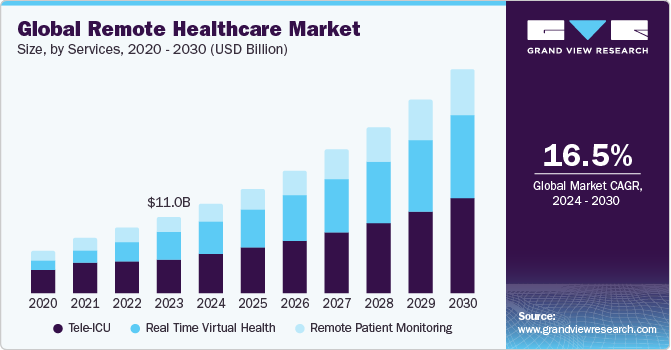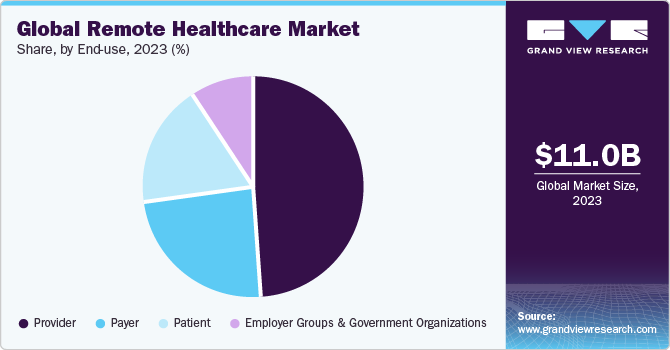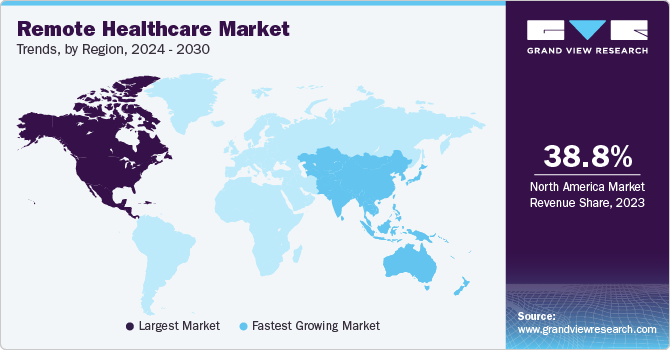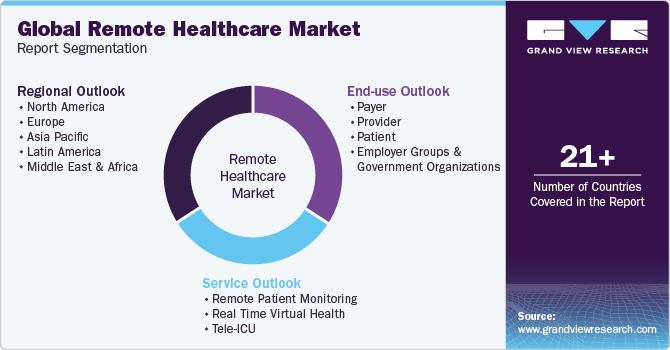
Remote Healthcare Market Size, Share & Trends Analysis Report By Service (Remote Patient Monitoring, Real Time Virtual Health, Tele-ICU), By End Use (Payer, Patient, Provider), By Region, And Segment Forecasts, 2024 - 2030
- Report ID: GVR-4-68039-374-2
- Number of Report Pages: 150
- Format: PDF, Horizon Databook
- Historical Range: 2018 - 2022
- Forecast Period: 2024 - 2030
- Industry: Healthcare
Remote Healthcare Market Size & Trends
“2030 remote healthcare market value to reach USD 32.2 billion”
The global remote healthcare market size was estimated at USD 11.0 billion in 2023 and is projected to grow at a CAGR of 16.5% from 2024 to 2030. Increasing digital technology, healthcare costs, and a need for accessible healthcare due to an aging global population are the key growth drivers for the market. Technology has always been a crucial element for these industries. The recent COVID-19 pandemic has accelerated the adoption of remote healthcare services, as they provide a safer alternative to traditional in-person consultations.

The adoption of wearable technology for health monitoring is driving the growth of the remote healthcare market. With devices capable of monitoring heart rate, blood glucose levels, and sleep patterns, patients are able to receive real-time monitoring, leading to accurate diagnoses and better outcomes. This trend is particularly significant in the wake of the COVID-19 pandemic, which forced healthcare offices worldwide to adopt telemedicine solutions to reduce the burden on doctors and prevent the spread of the virus.
The global shortage of ICU beds has also contributed to the growth of tele-ICUs, allowing for remote consultations and monitoring. Mobile applications have emerged, enabling patients to book online appointments and receive video consultations instead of visiting clinics physically. As internet connectivity continues to improve, remote healthcare services will become increasingly accessible and convenient.
The future of remote healthcare looks promising, with ongoing technological advancements expected to further drive the growth. Artificial intelligence (AI) will play a key role in analyzing patient data to aid physicians in making informed treatment decisions. Virtual Reality (VR) will also be utilized for remote therapy sessions, expanding the scope of remote healthcare services. As these technologies continue to evolve, we can expect the remote healthcare market to experience significant expansion and development in the coming years.
Service Insights
The tele-ICU segment dominated the market in 2023, accounting for 44.2% of the total revenue share due to its ability to provide real-time monitoring and remote access to patient data, enhancing patient care and reducing healthcare costs. It addressed the shortage of intensivists, particularly in rural and remote areas, by enabling remote consultation and monitoring. In addition, it facilitated collaboration and knowledge sharing among healthcare professionals, improving patient outcomes and reducing the length of hospital stays.
Remote patient monitoring services are projected to grow at the fastest CAGR of 17.6% over the forecast period, owing to their capacity to offer continuous and real-time monitoring of patients beyond traditional clinical settings. This enables healthcare providers to proactively manage patient health, identify potential issues at an early stage, and decrease hospital readmissions. Furthermore, these services have revolutionized patient engagement and empowerment globally, empowering individuals to take an active role in managing their own health.
End-use Insights
The provider segment dominated the market in 2023. The end users, primarily patients and healthcare providers, are finding immense value in remote healthcare. For patients, especially those living in remote areas or with mobility issues, telehealth services provide easier access to medical consultation. It saves time and effort spent on traveling and reduces exposure to healthcare-associated infections. Elderly patients and those with chronic illnesses can have their health monitored continuously without frequent hospital visits.

The patient segment is anticipated to witness the fastest CAGR of 17.7% over the forecast period. Remote healthcare aids healthcare providers in reaching a wider patient base and offer services more efficiently. It helps in better management of patient appointments, reduces patient’s missing appointments, and improves overall patient satisfaction.
Regional Insights
The North America remote healthcare market dominated the global market and accounted for the revenue share of 38.8% in 2023. The growth and adoption of remote healthcare services in the region is influenced by factors such as technological infrastructure, healthcare systems, and regulatory environments.

U.S. Remote Healthcare Market Trends
The remote healthcare market in the U.S. has experienced a surge in the adoption of telehealth services in response to the COVID-19 pandemic, as healthcare providers have rapidly transitioned to remote consultations to maintain continuity of care while minimizing the risk of virus transmission. The market’s growth has been further boosted by the increasing adoption of telemedicine and virtual health solutions, facilitated by technological advancements, supportive policies, and reimbursement for remote healthcare services. As a result, patients have gained convenient access to healthcare services, reducing the need for in-person visits and ultimately improving patient outcomes.
Europe Remote Healthcare Market Trends
The remote healthcare market in Europe also showcases significant promise, particularly in regions with strong technological infrastructure and a high concentration of tech-savvy patients. Countries such as the UK, Germany, and France have been quick to adopt remote healthcare, spurred by supportive government policies and the pressing need to manage growing healthcare costs.
The remote healthcare market in the UK is projected to experience substantial growth, fueled by technological advancements, supportive policies, and reimbursement for remote healthcare. This allows patients to access healthcare services conveniently, reducing the need for in-person visits and improving patient outcomes.
Asia Pacific Remote Healthcare Market Trends
The remote healthcare market in Asia Pacific is expected to witness the fastest CAGR of 17.9% over the forecast period, driven by the rising prevalence of chronic diseases like diabetes and hypertension, as well as the demand for cost-effective healthcare solutions. Additionally, the need for efficient healthcare management and increasing per capita healthcare expenditure in the region are also contributing factors to this growth.
The remote healthcare market in India is poised for significant growth, fueled by increasing consumer awareness of health and wellness, the rising incidence of chronic diseases, and the need for cost-effective healthcare solutions. This growth is expected to be driven by the adoption of remote patient monitoring devices, telemedicine platforms, and mobile health applications.
Key Remote Healthcare Company Insights
Key players working in the market are embracing different strategies such as partnerships, collaborations, mergers and acquisitions, and product development to extend product portfolio and geographic presence.
Key Remote Healthcare Companies:
The following are the leading companies in the remote healthcare market. These companies collectively hold the largest market share and dictate industry trends.
- Advanced ICU Care
- Koninklijike Philips N.V.
- Teladoc Health
- AirStrip Technologies
- Medtronic
- American Well
- Resideo Life Care Solutions
Recent Developments
-
In May 2024, Indonesia’s Health Minister launched SpaceX’s Starlink satellite internet service with Elon Musk for the country’s health sector, aiming to improve remote healthcare access. The service was launched at three health centers in Bali and Aru, showcasing its potential to enhance real-time data input and address health challenges.
-
In May 2024, Synapxe launched HEALIX, a cloud-based analytics platform for Singapore’s public healthcare sector. The platform combines cutting-edge cloud-native technologies, allowing for the swift development of AI models to enhance patient care. In partnership with AWS, Synapxe has created a platform designed to provide a standardized, secure, and scalable environment for data analytics projects.
-
In July 2023, Teladoc Health expanded its collaboration with Microsoft to integrate AI-powered solutions into its Solo platform, aiming to minimize administrative burdens on healthcare workers. The partnership leveraged Azure DeepAI Service, Azure Cognitive Services, and Nuance Dragon Ambient eXperience to automate clinical documentation and enhance patient care.
Remote Healthcare Market Report Scope
|
Report Attribute |
Details |
|
Market size value in 2024 |
USD 12.90 billion |
|
Revenue forecast in 2030 |
USD 32.25 billion |
|
Growth rate |
CAGR of 16.5% from 2024 to 2030 |
|
Base year for estimation |
2023 |
|
Historical data |
2018 - 2022 |
|
Forecast period |
2024 - 2030 |
|
Quantitative units |
Revenue in USD billion and CAGR from 2024 to 2030 |
|
Report coverage |
Revenue forecast, company ranking, competitive landscape, growth factors, and trends |
|
Segments covered |
Services, end use, region |
|
Regional scope |
North America; Europe; Asia Pacific; Latin America; MEA |
|
Country scope |
U.S.; Canada; Mexico; UK; Germany; France; Italy; Spain; Denmark; Sweden; Norway; Japan; China; India; Australia; South Korea; Thailand; Brazil; Argentina; South Africa; Saudi Arabia; UAE; Kuwait |
|
Key companies profiled |
Advanced ICU Care; Koninklijike Philips N.V.; Teladoc Health; AirStrip Technologies; Medtronic; American Well; Resideo Life Care Solutions |
|
Customization scope |
Free report customization (equivalent up to 8 analysts’ working days) with purchase. Addition or alteration to country, regional & segment scope. |
|
Pricing and purchase options |
Avail customized purchase options to meet your exact research needs. Explore purchase options |
Global Remote Healthcare Market Report Segmentation
This report forecasts revenue growth at global, regional, and country levels and provides an analysis of the latest industry trends in each of the sub-segments from 2018 to 2030. For this study, Grand View Research, Inc. has segmented the global remote healthcare market report based on service, end use, and region:

-
Service Outlook (Revenue, USD Billion, 2018 - 2030)
-
Remote Patient Monitoring
-
Real Time Virtual Health
-
Video Communication
-
Audio Communication
-
Email/Chat box
-
-
Tele-ICU
-
-
End Use Outlook (Revenue, USD Billion, 2018 - 2030)
-
Payer
-
Provider
-
Patient
-
Employer Groups & Government Organizations
-
-
Regional Outlook (Revenue, USD Billion, 2018 - 2030)
-
North America
-
U.S.
-
Canada
-
Mexico
-
-
Europe
-
UK
-
Germany
-
France
-
Italy
-
Spain
-
Denmark
-
Sweden
-
Norway
-
-
Asia Pacific
-
Japan
-
China
-
India
-
Australia
-
South Korea
-
Thailand
-
-
Latin America
-
Brazil
-
Argentina
-
-
Middle East & Africa
-
South Africa
-
Saudi Arabia
-
UAE
-
Kuwait
-
-
Frequently Asked Questions About This Report
b. The global remote healthcare market size was estimated at USD 11.0 billion in 2023 and is expected to reach USD 12.90 billion in 2024.
b. The global remote healthcare market is expected to grow at a compound annual growth rate of 16.5% from 2024 to 2030 to reach USD 32.25 billion by 2030.
b. The tele-ICU segment dominated the remote healthcare market and accounted for the largest revenue share of 44.2% in 2023.
b. Some key players operating in the remote healthcare market include Advanced ICU Care, BioTelemetry, Koninklijke Philips, Teladoc Health, Vivify Health, AirStrip Technologies, Medtronic, InTouch Technologies, American Well, and Resideo Life Care Solutions.
b. The increasing adoption of smartphones, mHealth apps, wearable technologies, and digital healthcare is estimated to drive the remote healthcare market globally. Moreover, the increasing number of investments in the remote healthcare industry is further bolstering market growth.
We are committed towards customer satisfaction, and quality service.
"The quality of research they have done for us has been excellent."




